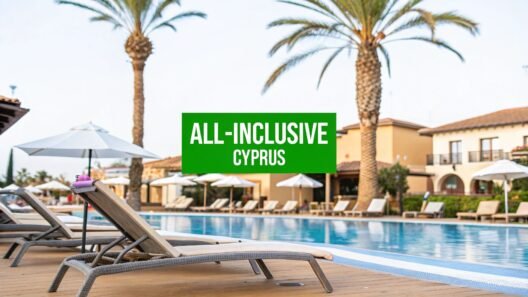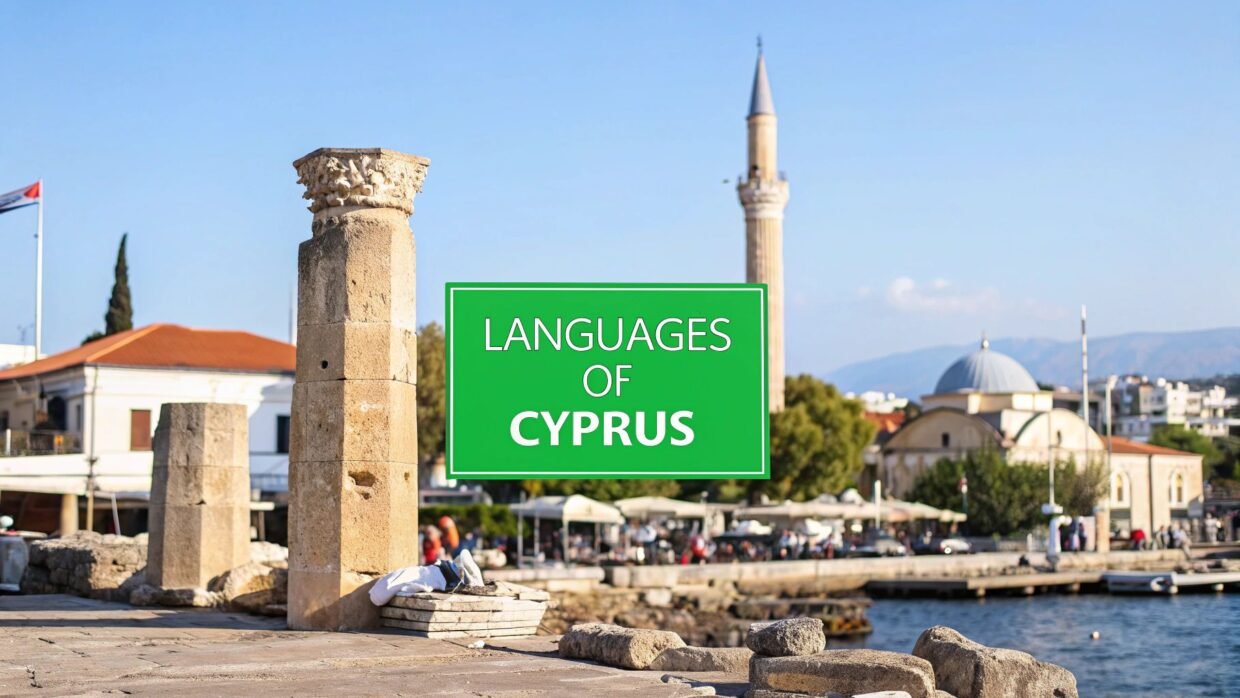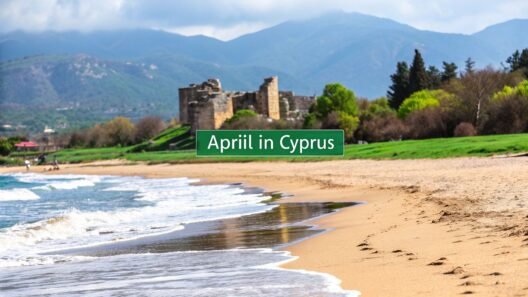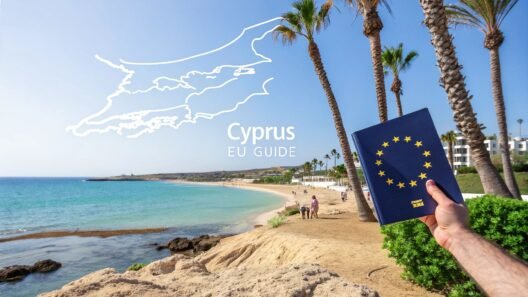So, what language do they speak in Cyprus? The answer isn't a simple one-liner; it’s a story that reflects the island's very soul. Officially, Cyprus is a bilingual nation with two recognised languages: Greek and Turkish. This simple fact is the first clue to understanding the island's rich, and often complex, cultural tapestry.
The Two Official Languages of Cyprus
Cyprus's intricate history and political landscape are directly mirrored in its language. The island is effectively divided, and this partition largely determines which language you'll hear and where.
Head to the southern part of the island—the Republic of Cyprus—and you'll be surrounded by Greek Cypriots speaking Greek. But if you cross the line into the northern region, you’ll find yourself in a Turkish-speaking environment among Turkish Cypriots. This isn't a situation where two languages mix freely across the whole island. Instead, your location dictates the language. For any visitor, this means the sounds of daily life can change completely depending on which part of the island you're exploring.
Greek in the South
The dominant language you'll encounter is Cypriot Greek. This is a unique dialect, distinct from the Greek spoken on the mainland, with its own pronunciation, vocabulary, and rhythm that have developed over centuries. It’s been shaped by the island's long and varied history, absorbing influences from the many cultures that have passed through.
But don't panic if you've brushed up on standard Greek for a holiday in Athens! You’ll be understood just fine. Cypriots are used to hearing different forms of Greek and will happily meet you halfway, often simplifying their speech to help you out. If you're digging into the island's heritage, you might find it useful to understand the broader relationship between the two nations by checking out our guide on whether Cyprus is in Greece.
Turkish in the North
Venture into the northern part of Cyprus, and Cypriot Turkish takes centre stage. Just like its Greek counterpart, this dialect has its own local flavour that sets it apart from the Turkish you'd hear in Istanbul or Ankara. It tells the story of a separate cultural and linguistic journey.
To make this clearer, here’s a quick summary of how the official languages are distributed.
Cyprus Languages at a Glance
| Language | Primary Community | Main Region of Use |
|---|---|---|
| Greek | Greek Cypriots | Southern part of the island (Republic of Cyprus) |
| Turkish | Turkish Cypriots | Northern part of the island (North Cyprus) |
This table neatly sums up the official linguistic divide, which is a living testament to the island's history.
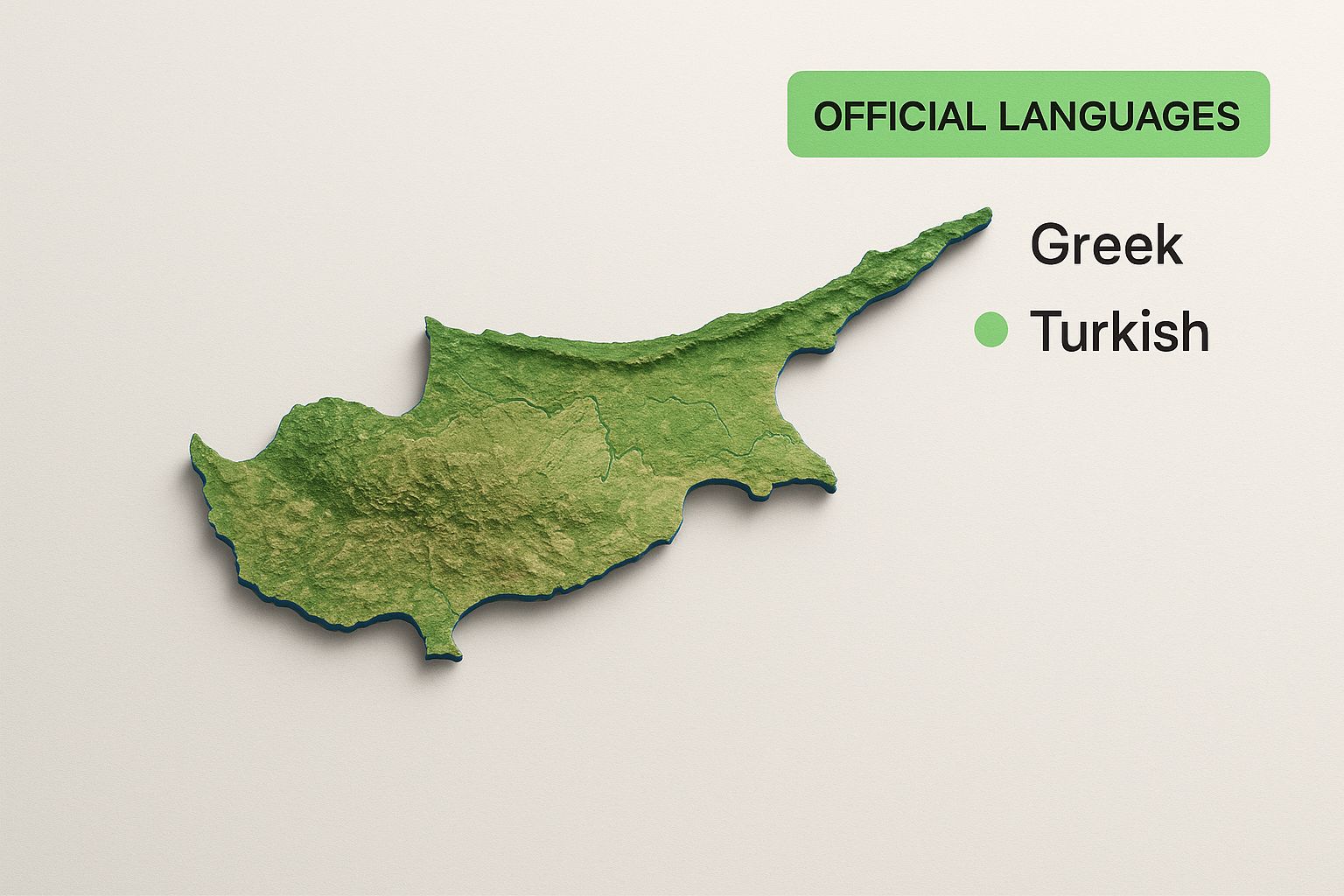
As you can see, the official bilingualism is more than just a line in a law book. It’s a fundamental part of the Cypriot identity, with each language defining a specific geographic and cultural space. This reality has been shaped by decades of political history, creating the unique linguistic landscape you'll find today.
Discovering the Unique Charm of Cypriot Greek

So, you know that Greek is an official language in Cyprus, and that’s a great start. But to truly tap into the island's local pulse, you need to understand Cypriot Greek. If you're used to the Greek spoken in Athens, hearing the local dialect for the first time is a fascinating experience.
Think about the difference between the Queen's English and the rich, colourful slang you might hear in a Dublin pub. They're both English, of course, but each has its own unique flavour, rhythm, and history. That’s a perfect way to think about Standard Greek versus Cypriot Greek.
The local dialect has spent centuries evolving on its own, absorbing influences from the island's long and layered history. You can hear echoes of Venetian, Ottoman, and even British rule in its vocabulary and pronunciation, creating a linguistic tapestry you simply won't find anywhere else.
What Makes Cypriot Greek Different?
The key distinctions really come down to pronunciation and vocabulary. Cypriot Greek often features harder consonant sounds and has held onto some ancient words that have long since faded from use on the mainland. You'll also encounter a treasure trove of unique local idioms that are part of the island's very fabric.
A simple greeting is a great example. You might say "How are you?" with the standard "Ti kanis?" in Greece. But here, you're more likely to hear "Ti kameis?" It’s these small but significant differences that give the local dialect its distinct character.
This multilingual environment is a hallmark of the island. Due to Cyprus's history as a British colony from 1878 to 1960, English is widely spoken and understood, playing a major role in business, education, and tourism.
This history has cultivated an impressive culture of multilingualism. In fact, an incredible 90% of Cypriots report speaking at least two languages, which towers over the EU average of 65%. You can dive deeper into this in a report on multilingualism in Cyprus.
Even so, learning a few basic Cypriot phrases will do more than just help you get by—it's a gesture that will be warmly appreciated by everyone you meet.
Why English Is Your Go-To Language for Travel
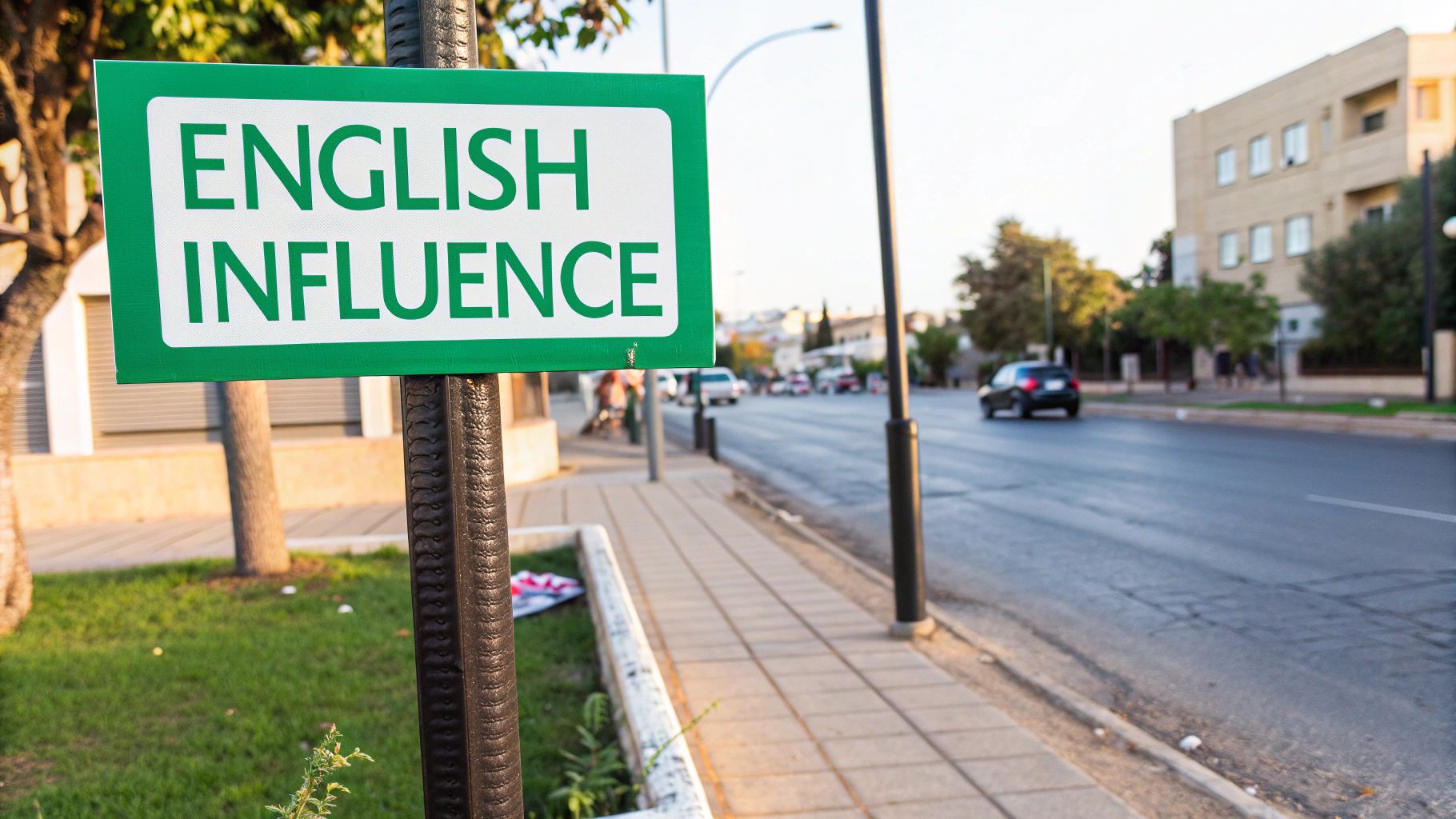
If you're wondering whether you'll manage to get by in Cyprus without knowing Greek or Turkish, you can breathe a sigh of relief. The simple answer is yes, absolutely. English is so widely and fluently spoken across the island that it almost feels like a third, unofficial language.
This isn't a recent development. The high level of English proficiency is a direct legacy of the island's past as a British Crown Colony from 1878 to 1960. Over those 82 years, English became deeply integrated into the government, the legal system, and, most importantly, the schools. This historical tie means generations of Cypriots have grown up with English as a fundamental part of their education and daily lives.
Navigating Cyprus with English
What does this mean for you as a traveller? Pure convenience. It doesn't matter if you're exploring the lively streets of Limassol or relaxing in a quiet village tucked away in the Troodos Mountains; you'll almost always find someone who speaks excellent English. This is particularly true for anyone working in tourism.
From the moment your plane touches down, you’ll find that English is the default language for visitors.
- Hotels and Airports: All staff are proficient, so checking in, asking for help, and making travel arrangements is completely straightforward.
- Restaurants and Cafés: Menus are nearly always printed in both Greek and English, and the waiting staff will have no problem taking your order or recommending a local dish.
- Shops and Markets: You can easily ask for prices, haggle for a bargain, or just have a friendly chat with the shopkeepers.
The prevalence of English makes Cyprus one of the easiest Mediterranean destinations to explore. It allows you to relax and soak up the sun, food, and culture without worrying about a language barrier getting in the way.
This linguistic comfort goes beyond just making purchases. Many Cypriots, especially younger people, are keen to practise their English and are genuinely happy to help with directions, share a story, or recommend their favourite beach. It creates a wonderfully welcoming atmosphere that makes every interaction feel relaxed and natural.
This ease of communication is a huge plus when you're managing different parts of your trip, like sorting out payments. And on that note, to be fully prepared, it's also a good idea to know what currency Cyprus uses. While picking up a few Greek phrases is always appreciated, you can travel with confidence knowing that English is all you really need for a smooth and incredible holiday.
The Rich Tapestry of Other Languages in Cyprus
Once you look past the official languages and the ever-present English, you start to see that Cyprus is a genuine linguistic melting pot. It's a modern, multicultural island that has always been a crossroads for different peoples, and you can hear that history just by walking down the street.
This is especially true in a city like Limassol. It's become a major hub for a large and vibrant Russian-speaking community. Spend any time there, and you'll hear Russian spoken everywhere – in shops, along the marina, and in bustling cafés. This reflects the city's powerful business and cultural connections, making Russian one of the most common minority languages on the island.
Languages with Deep Historical Roots
But the story doesn't end with Russian. Other languages have been woven into the fabric of Cyprus for centuries and are officially recognised for their historical importance.
- Armenian: The Armenian-Cypriot community has spoken this language on the island for generations. It holds a protected status and stands as a testament to a rich cultural heritage that has endured through time.
- Cypriot Maronite Arabic: This is another historically protected language, and it's truly unique. Spoken by the island's Maronite community, it's a fascinating living example of Cyprus's layered history.
This blend of languages, from the commerce-driven presence of Russian to the deep historical roots of Armenian, really showcases the island’s dynamic identity. It’s a place where many worlds meet, creating a vibrant cultural atmosphere.
This wonderful mix is often on full display during local events and celebrations. To see this cultural fusion for yourself, you can learn more about the various Cyprus festivals that take place throughout the year.
Right, so you've got a handle on the official languages of Cyprus. But knowing what people speak is one thing; actually connecting with them is another. Let's get into some practical tips that will help you communicate with confidence and maybe even make a few friends along the way.
While you'll find English is widely understood, especially in tourist areas, putting in a little effort with the local language can completely change the dynamic. It's a sign of respect, and it shows you're genuinely interested in the culture. Believe me, a small gesture like this is always appreciated and can turn a simple transaction into a warm, memorable moment.
Putting It Into Practice
You don't need to be fluent to make a great impression. A simple, friendly greeting is the perfect icebreaker.
When you walk into a shop or a taverna in the south, a cheerful “Yia sas” (pronounced yah-sas) will almost certainly be met with a smile. Head north, and a warm “Merhaba” (mer-hah-bah) will do the same. It’s such a small thing, but it really does set a positive tone.
And don't forget the magic words. A heartfelt “Efcharisto” (eff-kah-rees-toh) for "thank you" in Greek or “Teşekkür ederim” (tesh-ek-kur ed-er-im) in Turkish will go a very long way.
Essential Phrases for Your Cyprus Trip
To get you started, we've put together a quick cheat sheet. Don't stress about getting the pronunciation spot on – it's the effort that truly counts, and locals are usually more than happy to help you out.
| English | Greek (Phonetic) | Turkish (Phonetic) |
|---|---|---|
| Hello (formal) | Yia sas (yah-sas) | Merhaba (mer-hah-bah) |
| Goodbye | Andio (an-dee-o) | Hoşçakal (hosh-cha-kal) |
| Yes / No | Ne / Ochi (neh / o-hee) | Evet / Hayır (ev-et / hai-yir) |
| Thank you | Efcharisto (eff-kah-rees-toh) | Teşekkür ederim (tesh-ek-kur ed-er-im) |
| Please | Parakalo (pa-ra-ka-loh) | Lütfen (lutfen) |
These simple phrases are your key to unlocking a more authentic experience.
It's also interesting to see how this linguistic heritage travels. The connection between language and culture is strong, even for those living abroad. In the United Kingdom, for instance, there's a significant Cypriot community. As of 2021, around 21,000 Cypriot nationals called the UK home, a mix of both Greek and Turkish Cypriots who keep their mother tongues alive while being fluent in English. You can dive deeper into the data on the Cypriot population in the UK on Statista.com.
Remember, communication is about so much more than words. A smile, a patient nod, and genuine warmth are understood everywhere. These are the tools that will help you connect with the famously hospitable people of Cyprus, no matter which language you're speaking.
Your Cyprus Language Questions Answered
When you're planning a trip, getting your head around the local language situation is always a good idea. To make things simple, we've put together answers to the most common questions we hear about the languages spoken in Cyprus.
Do I Really Need to Speak Greek to Get By?
Not at all. While knowing a few Greek phrases is a lovely gesture and always appreciated, you absolutely don't need it to have a fantastic holiday.
English is spoken fluently in virtually all tourist spots, hotels, and restaurants throughout the Republic of Cyprus. You’ll have no problem ordering a meal, asking for directions, or chatting with shopkeepers using only English. People working in tourism, in particular, are excellent English speakers, so you can relax and enjoy a stress-free trip.
Is the Language Different in the North?
Yes, it is. The main language you'll hear in Northern Cyprus is Turkish, specifically the local Cypriot Turkish dialect. While you will still find plenty of English speakers, especially in popular towns like Kyrenia (Girne), it’s not quite as widespread as in the south.
Picking up a few Turkish phrases will go a long way and is a great way to connect.
- Merhaba (Hello)
- Teşekkür ederim (Thank you)
- Lütfen (Please)
Are the Road Signs in English?
Thankfully, yes! For anyone renting a car, this is a huge relief. In the Republic of Cyprus (the south), almost all major road signs are in both Greek and English. This makes navigating the island’s motorways and towns surprisingly easy, even if the Greek alphabet looks like, well, Greek to you.
In Northern Cyprus, the signs are mostly in Turkish, though you'll spot some English ones in the main tourist hubs.
I Learned Some Greek for a Trip to Greece. Will People Understand Me?
Absolutely, and your effort will be appreciated! If you speak Standard Modern Greek, you'll be understood perfectly across Cyprus.
Think of it like someone with a standard American accent visiting rural Scotland. You might notice a strong local dialect, but communication is perfectly smooth. Cypriots are used to hearing different accents and will understand you just fine. They’ll likely reply in Standard Greek or switch to English to make things even easier for you.
So, while you’ll hear the unique Cypriot dialect spoken between locals, don’t hesitate to use the Greek you know. It will definitely be understood and welcomed.





